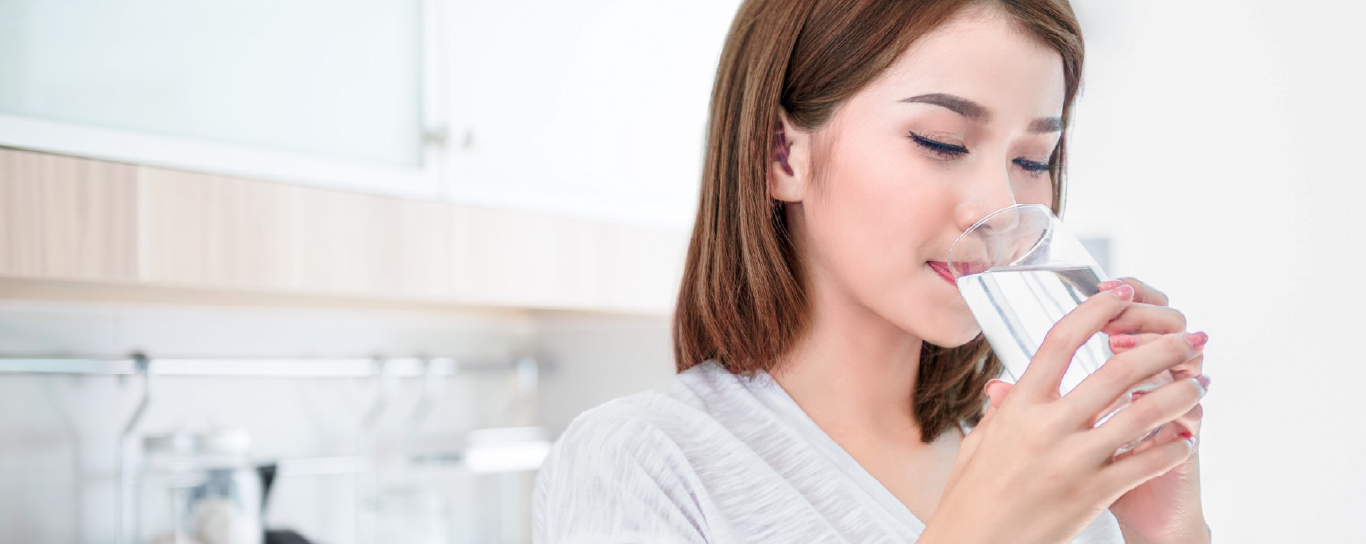
Can Drinking Water Tackle Dry Skin from Within?
Most of us have heard of how important water is for our blood, bodily fluids, and organs. In fact, approximately 60% of our body is made up of water. In addition to this, water is also essential for the normal functioning of our skin, especially the outer layer known as the stratum corneum (SC).
The relationship between the dietary intake of water and skin hydration is not 100% clear, but this is what we know
The right amount of water content in the SC is important for proper SC maturation & normal skin shedding.
Our skin cells are made up of 30% water, which helps keep skin elastic and resilient.
A lot of celebrities swear by drinking water to cure acne, fine lines, and wrinkles. Drinking water is also often promoted as a “skincare secret” and a way to delay aging! The science is not clear as to whether drinking water prevents acne and aging, but it is clear that dehydration (not drinking enough water) will affect your skin over time by reducing its elasticity and causing skin tenting, which is what happens when you pinch your skin and it stays up like a tent.
A handful of small studies have shown that people who drink more than 2 liters of water per day had improved SC hydration after 30 days.
Increasing water intake was also noted to reduce the dryness and roughness of skin, especially in those who were not drinking enough water to begin with. Although these studies are not robust enough to clearly understand the effects of drinking water and skin hydration, water has an important role in maintaining a healthy body and skin.
So, how much water should you be drinking?
The Institute of Medicine (IOM) in the United States suggests total water intake from all foods and liquids should be 3.7 liters (125 ounces) for men and 2.7 liters (91 ounces) for women daily. Another rule of thumb is to divide your weight in half and drink that amount in ounces; in other words, if you weigh 140 pounds, you should drink approximately 70 ounces of water each day, or 2 liters (there are approximately 34 ounces in 1 liter).
If you are someone that has a hard time drinking water, here are some tips
-
Infuse drinking water with fruit slices. Lemon, orange, or strawberry slices work well.
-
Drink warm water if you do not like the sensation of cold water.
-
Drink unsweetened tea, and avoid sugary teas or beverages. Drinks high in sugar will lead you to feel thirstier.
There are no strong trials which evaluate whether drinking water can achieve fully hydrated, glowing skin, but many people swear by it! At the very least, it is not harmful and will prevent your skin from appearing or feeling dry and itchy.
References:
1. Verdier-Sevrain Sylvie and Bonte Freeric. Skin Hydration: a review on its molecular mechanisms. Journal of Cosmetic Dermatology. 2007: 6; 75-82.
2. Rosinger A, Herrick K. Daily water intake among U.S. men and women, 2009–2012. NCHS data brief, no 242. Hyattsville, MD: National Center for Health Statistics. 2016.
3. Liska, D., Mah, E., Brisbois, T., Barrios, P. L., Baker, L. B., & Spriet, L. L. (2019). Narrative Review of Hydration and Selected Health Outcomes in the General Population. Nutrients, 11(1), 70. MDPI AG. Retrieved from http://dx.doi.org/10.3390/nu11010070
4. Akdeniz, M., Tomova-Simitchieva, T., Dobos, G., Blume-Peytavi, U., & Kottner, J. (2018). Does dietary fluid intake affect skin hydration in healthy humans? A systematic literature review. Skin research and technology : official journal of International Society for Bioengineering and the Skin (ISBS) [and] International Society for Digital Imaging of Skin (ISDIS) [and] International Society for Skin Imaging (ISSI), 24(3), 459–465. https://doi.org/10.1111/srt.12454
5. Palma, Lidia & Monteiro, Carla & Tavares, Liliana & Bujan, Maria & Rodrigues, Luis. (2012). Relationship between the dietary intake of water and skin hydration: Relação entre a ingestão dietária de água e a hidratação cutânea. Journal Biomedical and Biopharmaceutical Research. 9. 173-181. 10.19277/BBR.9.2.39.
